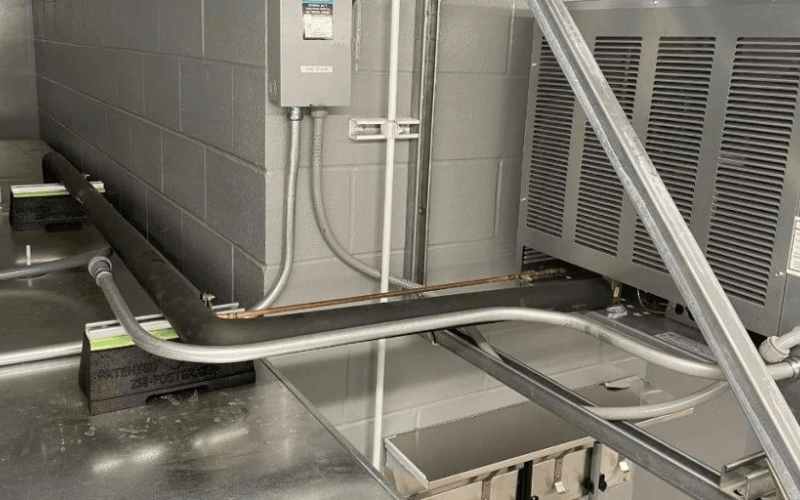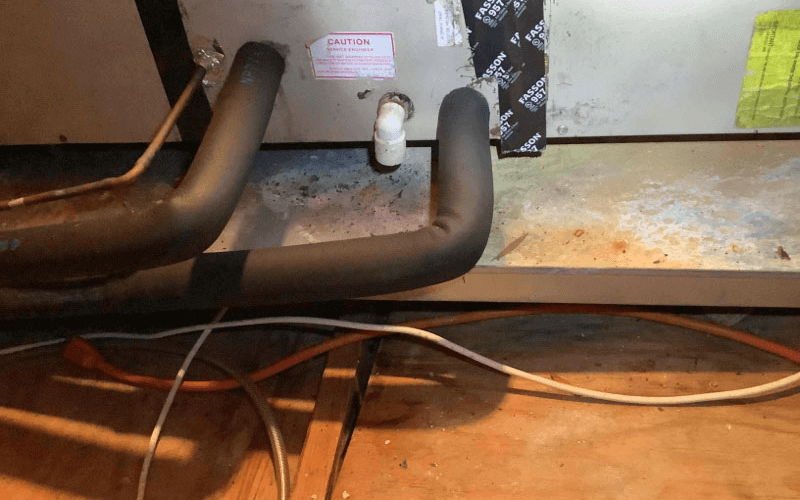It is essential to have hot water available throughout the day, particularly in cold climates, and water heaters excel in this regard. They supply us with piping hot water for all of our domestic needs. Accidents are more likely when proper maintenance procedures are not followed.
Table of Contents
ToggleIf you fear an explosion, you may decide that turning off your water heater is the best course of action. However, Can the Water Heater Explode If Turned Off?
It isn’t always a big deal if the water heater is turned off. Instead, it can assist in reducing energy waste. Even when turned off, a heater must be handled carefully to avoid injuring yourself or setting it off.
A variety of factors can cause explosions and other problems with water heaters. If the pressure is too high, the machinery is broken, or there isn’t enough preventive maintenance, life and property may be jeopardized.
Water Heater Working.
Inside a water heater, not much happens. They use a heat source to warm the water, which is then stored in a reservoir. The device can be programmed to keep the water at a specific temperature.
Also, Read: Can a Water Heater Explode?
Components and Operation.
The tank, thermostat, heating element, and pressure relief valve are a water heater’s four most important components. The thermostat regulates the temperature, the heating element heats the water, and the pressure release valve prevents dangerously high pressure from building up.
Water Heater Explosions: Reality or Myth?
It is not a myth that water heaters occasionally explode. This occurs mainly because the safety mechanisms that prevent dangerous pressure from building up inside the unit fail. Let us look into this further.
How Common Are Fires In Water Heaters?
Water heater explosions caused by pressure buildup are most often caused by improper installation, neglect, or misconfiguration, but they can be extremely dangerous when they do occur. According to the US Consumer Product Safety Commission, 20,000 water heater fires occur annually in the United States. These fires kill 140 people, injure 480 others, and cause $1.1 billion in property damage.
The National Fire Protection Association conducted its research and discovered that between 2009 and 2013, there were approximately 2,500 fires in private homes caused by water heaters. Follow the manufacturer’s installation and maintenance instructions, frequently check the temperature and pressure relief valves, and replace broken or worn-out units.
Also, Read: Can A Leaking Water Heater Be Repaired
Safety Features.
Modern water heaters have numerous safety features that activate if something goes wrong. The T&P and pressure relief valves are the most important (Temperature and Pressure).
The water will automatically flow through the valve if the pressure or temperature inside the tank exceeds the preset limits. Another possible safety feature is a thermostat with an automatic shut-off feature that turns off the heating element if the temperature rises too high.
What Happens When You Turn Off the Water Heater?
The presence or absence of a water heater does not imply that it will or will not explode. However, if a water heater is turned off too frequently, it may not function properly or be as useful.
Short-Term Effect.
Turning off a water heater when away from home for an extended time can immediately decrease energy bills. However, you must wait for your hot water to reheat before using it.
To switch off a gas water heater, you may need to relight the pilot, which some people find bothersome.
Long-Term Effect.
When you turn on and off a water heater regularly, you might damage the thermostat and other parts, leading to failures in the long run. Water that does not move can cause the tank of a tank-style heater to rust. If you live in a hard water area, minerals can quickly accumulate in the tank if water is left in it for an extended period.
Also, Read: Can a Water Heater Explosion Kill You?
Is it Possible to Use Water If The Heater Is Off?
If you switch off your water heater, you can still use the water, but it will not be hot. A water heater’s principal function is to heat water for home functions such as bathing, cleaning dishes, and washing clothing.
When turned off, it does not affect your home’s cold water. Cold water is still available to drink, wash your hands, and flush the toilet. Your typical routine won’t be unaffected, but you’ll be in for a nasty shock if you fail to turn on the heat before showering.
Warning Signs Of An Impending Explosion.
Before a water heater explodes, it may display warning signs that something bad is about to occur. A disaster can be avoided if these warning signs are recognized in time.
Excessive Heat or Noise.
If your water heater begins to make more noise or becomes hotter, it indicates something is wrong. If your heater pops, cracks, or rumbles, it’s most likely due to sediment buildup at the bottom of the tank.
If sediment accumulates in the water heater, it may have to work harder, causing it to overheat and increase the pressure. A broken thermostat or pressure relief valve could be to blame if the outside of the tank or the hot water lines leading into your home are too hot to touch.
Rusty and Leaking.
Another sign that something is wrong with your water heater is if it leaks. A faulty pressure relief valve, a rusted tank, or pipework can cause this issue. An explosion could occur if a relief valve fails to release excessive pressure properly.
Internal corrosion, which can weaken the tank and cause it to explode under pressure, is indicated by rust in your hot water system or tank.
Water Color Variations.
Water that looks or feels dirty could suggest rust or mineral accumulation inside the tank. Either of these problems can cause overheating and pressure buildup. It’s also crucial to watch for changes in the scent or taste of your hot water, as this could suggest a problem.
What Should You Do If Symptoms Appear?
If you discover indicators of an impending explosion, act fast to avoid a calamity.
Immediate Action.
Before proceeding, ensure that the water heater is unplugged and turned off. If the water heater is powered by gas, switch off the gas as well. Never relieve the pressure on your own since hot water or steam might burn you severely.
Professionals Should be Contacted.
When inspecting and repairing something, always contact a competent professional. Working on a water heater is dangerous, so leave it to the specialists.
Recent and Safe Technology.
Some newer models include advanced safety features such as digital temperature displays that make it simple to monitor the temperature. These automatic shut-off mechanisms turn off the heater if it becomes too hot or if pressure builds up, and Leak Detection Sensors.
How Dangerous Is It If Your Heater Explode?
The effects of a water heater explosion could be severe for your health. Water heaters that are not properly maintained, do not function correctly or are overworked can explode and shoot metal shards and hot water across a vast area, harming or killing people.
These explosions can inflict severe harm, such as burning or killing people. Explosions can cause extensive property damage. Fires caused by defective power or broken gas lines are two examples.
That is why monitoring the pressure within your water heater and checking the pressure relief valves to verify everything is in functioning order is vital. Don’t be deceived by its apparent simplicity. That item in your utility closet is enticing.
Conclusion.
Water heaters enable modern homes to have constant access to hot water. Even if they do not pose a significant threat to the average person, every homeowner should know how they operate, what risks they may pose, and what safety features they have.
If you perform regular maintenance, spot problems early, and know what to look for, your water heater should last long.
FAQ.
Is it dangerous to turn off the water heater?
If you need to turn off the water, turn off the water heater first. While many water heaters will operate normally without a water supply, low water pressure or a low water level within the tank may cause the heater’s components to overheat and burn.
How long can you leave a water heater off?
According to plumbing companies, homeowners should turn off the water heater if the water has not been flowing for more than 24 hours.
What is the reason for a water heater blowing up?
Pressure is frequently a factor in a water heater exploding. If the pressure within the unit reaches too high, an explosion may occur. A water heater can catch fire and explode as well. A catastrophic explosion can occur if the unit or the surrounding area catches fire.





















